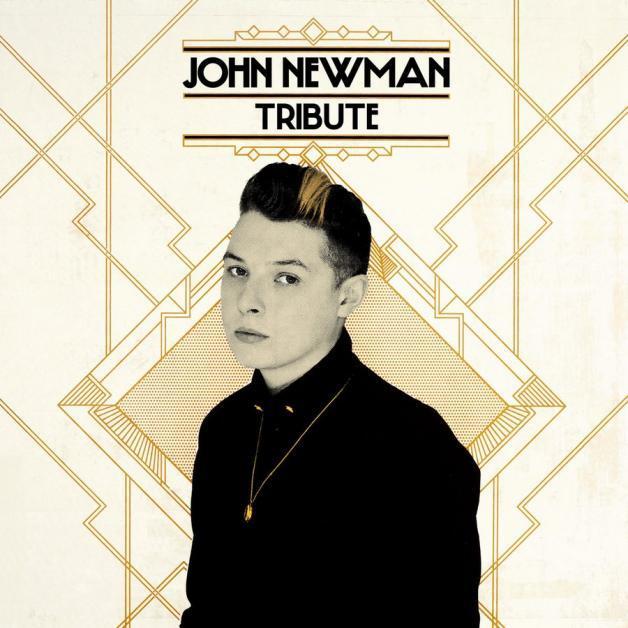by Sam Carter
It’s hard not to talk about mimicry in today’s music business; I even managed to shoehorn it into my review of Jake Bugg‘s Shangri La two weeks ago. But when an artist openly looks to the past in the way that John Newman appears to on his debut album Tribute, it’s hard not to take notice. From the Gatsby-esque cover art to the blonde streak that runs through his sizeable quiff, it’s initially hard to tell whether Newman is aiming his sights at earnest adulation or colourful caricature.
The 23-year-old from North Yorkshire certainly wears his inspirations on his sleeve, setting aside Tribute’s first minute to cite an impressive list of influences that ranges from Ray Charles and Franki Valli to Adele and Beyonce. Predictably, this debut has also been mentioned in the same breath as the likes of Amy Winehouse and Plan B’s The Defamation of Strickland Banks, but reviewers have been keen to seek out qualities that set Newman apart.
Before this album’s original release back in October, listeners will have associated Newman with his soulful turn on the Rudimental’s “Feel the Love” in 2012. These songs were a precursor to a slew of hits in Britain before the singer’s debut made its way across the Atlantic. So far, it’s hard to argue with the popularity that has met his rebranding of old-school soul for the iTunes generation – at the time of writing, Newman’s “Love Me Again” has amassed over 70 million views on YouTube.
As part of Tribute‘s opening salvo, that song is an bold showcase of Newman’s approach. Drums, horns and strings all eagerly vie for attention in a chorus that’s announced by clipped electric guitar. The latter is a small touch, perhaps, but it’s these quirks that signal Newman’s intention to blend contemporary pop with the dancehall energy of Northern Soul. The result is foot-stompingly infectious, not least because of the vocal weight that he’s able to throw behind every note.
Newman’s voice, located somewhere between classic Motown singers and the gravelly tone of James Morrison, is an eminently listenable thing – whoever it reminds you of, his distinctive rasp never grows tiresome. It’s reliable, too; carrying an impassioned punch that reinforces everything from the battle cry of “I should be loving you” on “Goodnight Goodbye” to the breathless, pleading promises of “Try”.
Thankfully, there are some real moments of variety amongst the trumpet-toting madness. “Running” is an exercise in choral melodrama that’s reminiscent of Emeli Sandé, “Losing Sleep” fuses bitter pain with sing-out-loud charm, and the innocent, high-pitched interjections of “Gold Dust” keep this from being a record drenched entirely in nostalgia.
Make no mistake – behind the sentimental bravado, this is a quintessential breakup album. The violin-soaked cry of “Whoever Said Love Was Easy” is as anguished as it gets, and Newman treats his wounds by blowing them up to a monumental scale: “Trying stop a river when it wants to rise / Trying to stop a blaze off a burning fire / I’m a hurricane, it ain’t stopping.”
Occasionally, the music also keeps pace with the sobriety of the lyrical content. While it lasts, “Out of My Head” is a slow-burn ballad that strips away the usual feverish drum backing and string section. It’s a rare downshift, though; by the time Newman’s argued and yelled his way to the thumping album closer “All I Need is You,” all the glasses have been shattered, the furniture’s been upended, and it’s hard not to feel completely and utterly drained.
Depending on your taste, that consistent energy is either the album’s biggest weakness or its greatest strength. The easily-telegraphed structure of “Cheating” comes at the cost of retreading a familiar pattern: croon, clap, rinse, repeat. But it’s also one of this album’s standout tracks, producing a confident mixture of OTT instrumentation, stinging vocals, and rapid shifts in tempo – in other words, everything that makes Newman’s sound so damn enjoyable.
It’s no surprise that Tribute is largely a work of emulation rather than reinvention. John Newman plays with that label throughout this album, leaving us to judge him by his individual talents rather than any copycat credentials. More specifically, his big voice and density of hooks alone make this an entertaining, if rather brash, listen. With a touch more variety and a dash of restraint, he could soon stand out from the crowd.
Rating: 7.1/10

